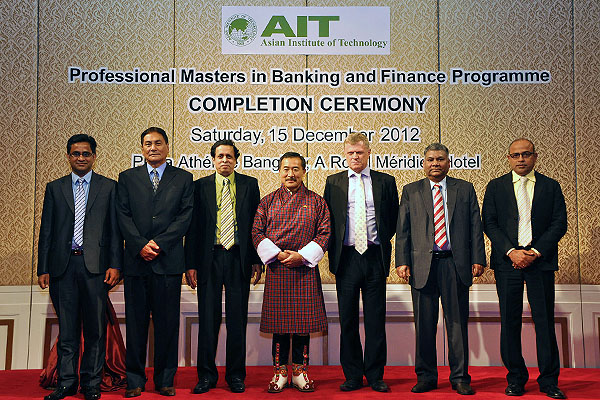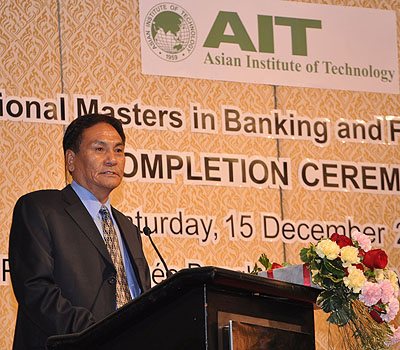In a strong signal
to the growing regional stature of AIT’s nascent Professional Master’s
in Banking and Finance (PMBF) Program, two of Asia’s senior most
bankers graced the second Completion Ceremony of the program held on 15
December 2012, addressing diplomats, dignitaries, graduates and AIT
officials in Bangkok.
Mr. Daw Tenzin,
Governor of the Royal Monetary Authority of Bhutan (RMB) and Mr. Md.
Ahsan Ullah, Executive Director of Bangladesh Bank, spoke on banking
and finance perspectives of their respective countries and globally as
they witnessed 26 of their countrymen and women receive completion
transcripts for their degree.
A total of 16
students from Bangladesh and 10 students from Bhutan will be conferred
their degree from the School of Management, AIT, at the
118th Graduation Ceremony on December 18. Employees of
Bangladesh Bank and the Bank of Bhutan, the tight-knit class of
mid-level managers completed the 9-month program run by AIT Extension
while on extended leave from their jobs, living and studying on
campus.
Extending words of
congratulations and thanks on behalf of AIT President Prof. Said
Irandoust, AIT Extension Executive Director Dr. Jonathan Shaw
emphasized the special relationship AIT shares with both countries in
terms of partnership for elevating professional skills and human
capacity. The PMBF is an innovative attempt at banking and finance
education that emphasizes banking for positive development which seeks
to avoid the mistakes of the recent global financial crisis, he
said.
Calling the Asian
Institute of Technology “a very special institute”, Governor Tenzin was
matter-of-fact in his assessment of the PMBF and of AIT’s ability to
educate his staff in this highly specialized subject. “Banking is a new
business in Bhutan, and the challenges of banking and finance are
enormous,” he said. “AIT is an option for our central bank.”
The Governor of RMB thanked H.E. Mr. Kesang Wangdi, Ambassador
of the Kingdom of Bhutan to Thailand, for his support
for the program, and wished the graduates well in their careers. He
told them to keep learning, think like a banker, focus on credit and
debt issues, and be vigilant in one’s knowledge of the economy. He also
cautioned the bankers all to heed the lessons on the recent liquidity
crisis and to be mindful of the enormous challenges associated with
global financial integration.
Bangladesh Bank Executive Director Mr. Md. Ahsan Ullah offered an
in-depth look at the financial system in Bangladesh, and pointed out
key developmental themes of the country’s Central Bank, such as its
pioneering role to promote environmentally-friendly banking
practices.
Drawing on historical references, the top banker emphasized the
evolving nature of banking globally, stressing possibilities for
improving societal welfare. “Central banks have a development role,” he
stated, which should and entail close monetary and fiscal policy
coordination. Officials should strive for inclusive growth and reducing
Gini coefficients as “per capita income is not a panacea” in terms of
achieving societal happiness, he stated.
For PMBF Program Coordinator Dr. Sundar Venkatesh, the
modular program is moving forward in the right direction by emphasizing
the very highest quality. The PMBF emphasizes practice with a
strong theoretical underpinning, he said. "We conducted aptitude tests
for 100 applicants from Bangladesh Bank, and from these sixteen were
taken."
Students are also regulary exposed to senior experts and speakers who
conduct real monetary policy, he stressed, and
the program includes faculty members from many of
Thailand and India's finest universities, apart from AIT. Not
content with the program's success so far, Dr. Venkatesh said he
is investigating different delivery models for the PMBF which
began in 2011, such as in-country instruction and online
learning.

First Secretary, Embassy of Bangladesh; Mr. Daw Tenzin; Mr. Fazle
Karim, AIT Extension;
H.E. Mr. Kesang Wangdi; Dr. Jonathan
Shaw;
Mr. Md. Ahsan Ullah;
and Dr. Sundar Venkatesh, PMBF Director,
AIT.

